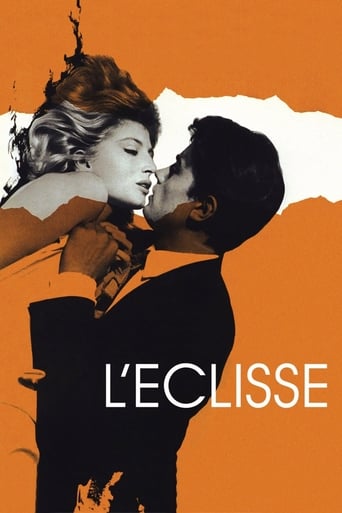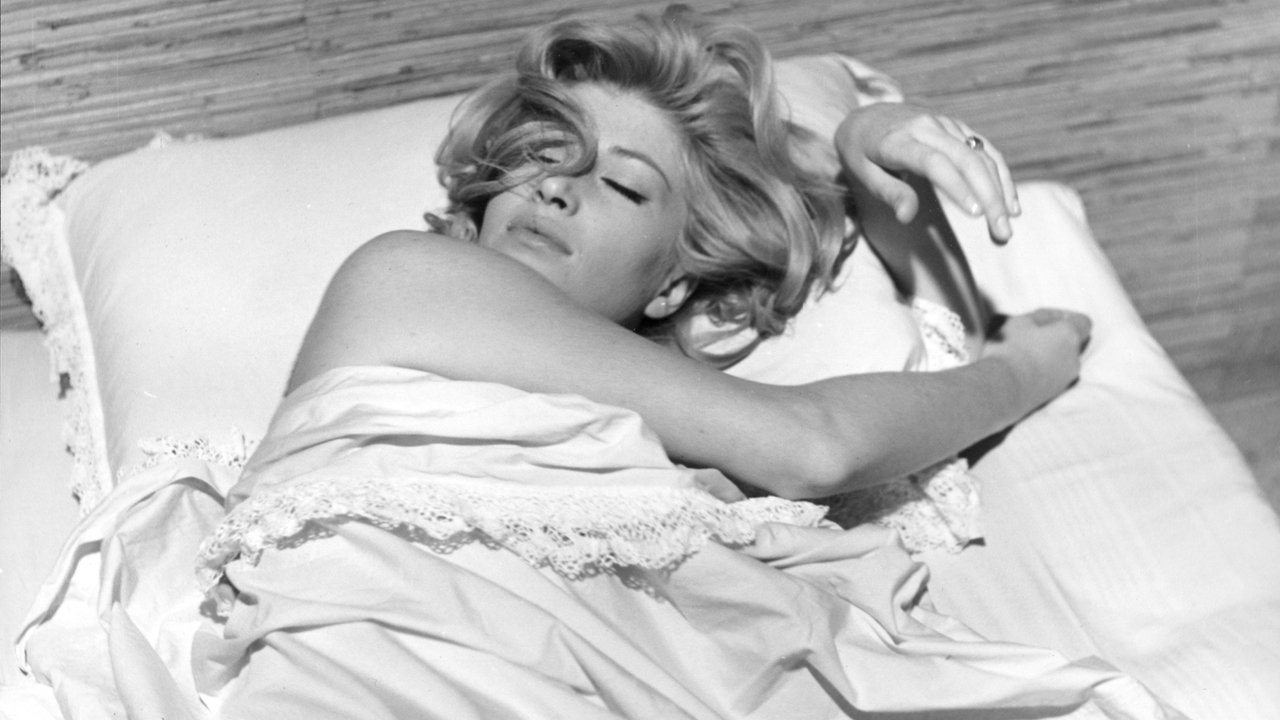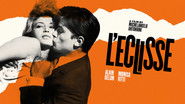antoniocasaca123
I think it becomes clear in the film that the relationship between Monica Vitti and Alain Delon will also fail, so distant are the ways of being each other, she (apparently) being happy with trivial and simple things and not giving value to money, he extremely "scrambled" and materialistic. It's a film with the Antonioni brand, undoubtedly, there are all the elements that characterize the films of this excellent filmmaker. The filming is magnificent, as always. Even so, I think the film is slightly below other films of the same as "la notte", "il desert rosso", "blowup" or "zabriskie point".
elvircorhodzic
L'ECLISSE is a romantic drama about an alienation, life's riddles and relationships.Vittoria, a young literary translator, breaks off her relationship with her boyfriend, an older writer, in his apartment, following a long night of conversation. Sometime later, she visits her mother at the frantic Rome Stock Exchange, which is very busy upon Vittoria's entrance. She meets a young and energetic stockbroker. He is her mother's stock broker. Vittoria attempts to discuss her own recent breakup, but her mother is preoccupied with her earned profits. However, she is impressed with a young stockbroker, his character, outlook and business...Mr. Antonioni has continued his tradition. His vague and abstract pictures are a reflection of human relations and interests. The protagonists are sad, confused and somewhat lifeless. This is not a story about an unhappy or elusive love. This is a story about the needs and emotions in a material world. Mr. Antonioni has made a contrast between the inner moods of a woman and intimidating behavior of a group of people who run for the money. His unconventional narrative reveals a naked truth, especially in final scenes.The characters are lost and vague.Monica Vitti as Vittoria is a timid and suspicious young woman, who sees the pieces of greed and lust in the people around her. Due to her lack of confidence and self introversion, she is trying to establish an abstract relationship with objects. Alain Delon as Piero is a young beauty from a material world. He, unconsciously, complements Vittorias nature. However, his relaxed approach, in terms of love, has a negative effect on her.The last scenes are a kind of projection of a material life, in which a normal existence is not possible.
ags123
In this, his third film about the boredom and alienation of modern society, Antonioni reaches new heights in boring and alienating his audience. While Monica Vitti is indeed a beautiful and charismatic screen presence, watching her wander aimlessly for over two hours quickly loses its appeal (Though I'll take it over watching Jeanne Moreau wander aimlessly for over two hours in "La Notte"). Occasional sparks of interest go nowhere, as in her quest to find the lost dog. The "African" sequence is far more shocking today than it was half a century ago, seeing how it flies in the face of today's overbearing political correctness. None of these episodes amount to much; we already get where Antonioni is going from the opening sequence in which the two lovers are monosyllabically calling it quits. If you enjoy watching paint dry and then analyzing a blank canvas, this film will provide lots of fodder.
chaos-rampant
Going backwards through Antonioni's films, I encounter what is with the exception of Blowup his most famous film, one of the cornerstones at least. Forty years after it was made it stands as a prophecy of minimal cinema to come, an early configuration of what is possible to do with a certain kind of story, but sadly not much more.I like how he renders the morning after a painful breakup, with anguish and irritation in empty streets, but also with the aimless excitement of newfound freedom and time. Monica Vitti fills this time that would have been consumed before with the affairs of a relationship by strolling around, the world now a game of possibilities, where the lack of purpose and direction hold their own allure. Life can be anything again. This is not an opportunity to meditate though, but rather of becoming open again to the flow of life, see where desire will sweep us to.Summer is a character here, indeed in a way that prefigures the transparent realities that would emerge in Antonioni's later films, I can sense poignantly the hot languid mood of summer life in the city, at once inviting and arresting movement. But the romance that is supposed to carry the film after the world has been sketched is not up to the task. The two partners feign, thrust, fall in love, coy or anxious or excited, then withdraw. The flow of life doesn't stop for the dead and it does't stop for the lovers. Two scenes connected by the incessant ringing of telephones connect this. Perhaps the romance is not up to the task because Antonioni believes that love isn't, that the two partners brought close in communion are still worlds apart and love alone cannot hope to bridge the distance. We get the first inklings of the emptiness of desire, Antonioni would perfect this in his following film.The importance of all this is perhaps that in 1962 it was desirable to see a love story done this way. The novelty alone was thought enough to vindicate the experiment.But when Antonioni feels free to be as New Wave as he wants in the finale, the film soars. The symbolism of a barrel of water that represents something running out deafens the ears amid all the silence - it says too much and too little. But that silence of shots deserves to be admired, more Japanese than French.


 AD
AD





